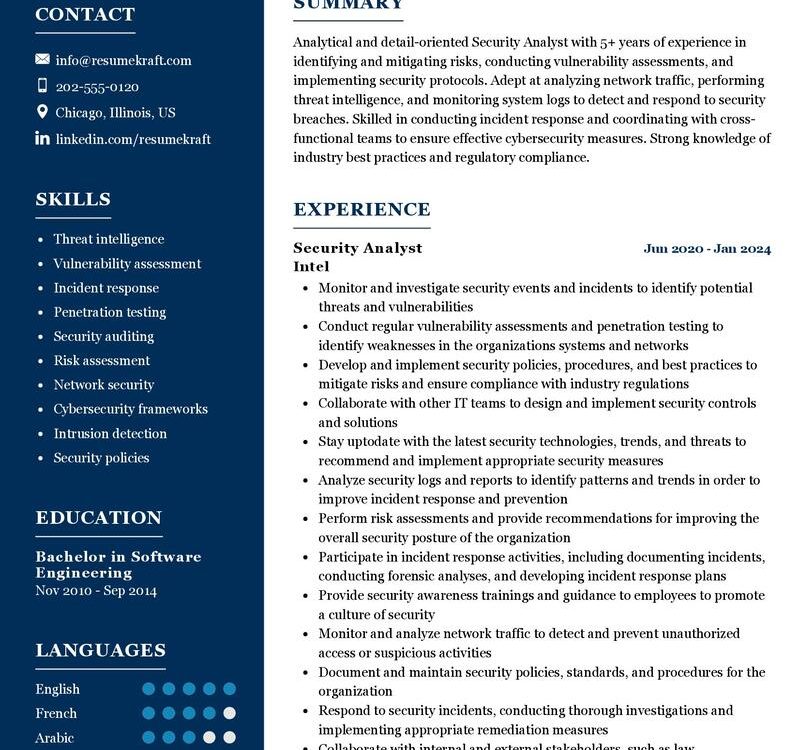Understanding the Role of a Security Analyst
In today’s digital age, the role of a Security Analyst has become increasingly crucial. Organizations worldwide are facing a growing number of cyber threats, making security analysts indispensable assets in safeguarding sensitive information and ensuring smooth operations. Let’s explore the multifaceted role of a Security Analyst, delving into their responsibilities, required skills, and the path to becoming one.
What Does a Security Analyst Do?
A Security Analyst plays a vital role in maintaining the security of an organization’s digital assets. Their primary responsibility is to protect the organization’s information systems from cyber threats and vulnerabilities. This includes:
- Monitoring networks and systems for security breaches or intrusions.
- Investigating security incidents and recommending appropriate actions.
- Implementing security measures to protect against malware, unauthorized access, and other threats.
- Conducting security assessments and audits to identify weaknesses and areas for improvement.
- Developing and updating security policies and procedures to ensure compliance with regulations and industry standards.
Additionally, Security Analysts often collaborate with other IT and security professionals to develop and implement security solutions tailored to the organization’s needs.
Key Skills and Qualifications
Becoming a successful Security Analyst requires a combination of technical expertise, analytical skills, and attention to detail. Here are some key skills and qualifications necessary for this role:
- A strong understanding of networking concepts and protocols.
- Proficiency in security tools and technologies, such as firewalls, intrusion detection systems, and antivirus software.
- Knowledge of common security frameworks and standards, such as ISO 27001 and NIST Cybersecurity Framework.
- Excellent problem-solving and critical-thinking abilities to analyze security incidents and develop effective solutions.
- Strong communication skills to effectively communicate security risks and recommendations to stakeholders.
- Attention to detail and the ability to stay updated on the latest security trends and threats.
While a degree in computer science, information technology, or a related field is often required, practical experience and relevant certifications, such as Certified Information Systems Security Professional (CISSP) or Certified Ethical Hacker (CEH), can also be valuable assets.
Responsibilities of a Security Analyst
The responsibilities of a Security Analyst may vary depending on the organization’s size, industry, and specific needs. However, some common responsibilities include:
- Monitoring security logs and alerts to detect and respond to security incidents.
- Conducting vulnerability assessments and penetration testing to identify potential weaknesses.
- Creating and maintaining documentation related to security procedures and incident response plans.
- Collaborating with other departments to ensure security measures are integrated into new projects and initiatives.
- Providing security awareness training to employees to promote best practices and mitigate risks.
- Participating in incident response activities, including investigations and remediation efforts.
Overall, Security Analysts play a critical role in protecting organizations from cyber threats and ensuring the confidentiality, integrity, and availability of sensitive information.
Writing a Security Analyst Resume
When crafting a resume for a Security Analyst position, it’s essential to highlight your relevant skills, experience, and qualifications. Here are some tips to help you create a standout resume:
- Include a clear and concise summary of your professional background, emphasizing your expertise in cybersecurity.
- Highlight specific achievements and projects where you successfully identified and mitigated security risks.
- List relevant certifications, such as CISSP or CEH, to demonstrate your commitment to professional development.
- Showcase your technical skills, including knowledge of security tools and technologies.
- Tailor your resume to the specific job description, emphasizing skills and experiences that align with the position requirements.
By following these tips, you can create a compelling resume that showcases your qualifications and positions you as a strong candidate for the role of Security Analyst.
Conclusion
Security Analysts play a crucial role in safeguarding organizations from cyber threats and ensuring the integrity of their information systems. With the increasing prevalence of cyber attacks, the demand for skilled security professionals continues to grow. By developing the necessary skills, obtaining relevant certifications, and gaining practical experience, you can embark on a rewarding career as a Security Analyst.
Finally, feel free to utilize resources like AI Resume Builder, Resume Design, Resume Samples, Resume Examples, Resume Skills, Resume Help, Resume Synonyms, and Job Responsibilities to create a standout application and prepare for the Security Analyst job interview.


